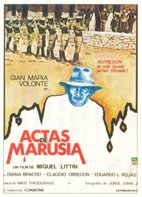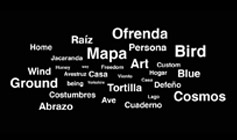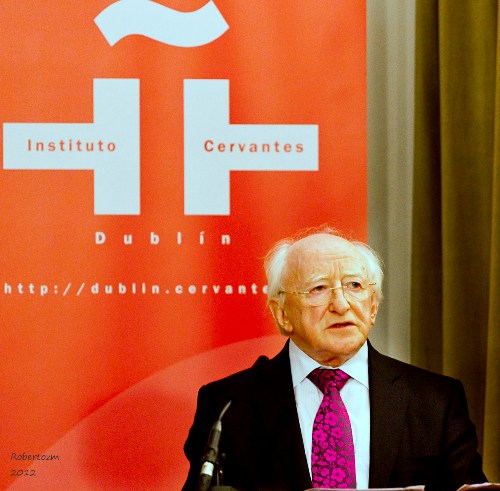Blog del Instituto Cervantes de Dublín
Torre Martello
Exhibition | Exposición: José Guadalupe Posada. 100 years
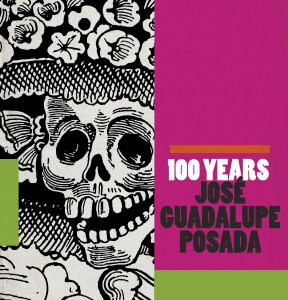 We invite you to enjoy today the official opening of a new exhibition organized by the Embassy of Mexico in Ireland: José Guadalupe Posada. 100 years. The event will be today at 7pm in the Exhibition Room. You can enjoy this fantastic work until July 4th.
We invite you to enjoy today the official opening of a new exhibition organized by the Embassy of Mexico in Ireland: José Guadalupe Posada. 100 years. The event will be today at 7pm in the Exhibition Room. You can enjoy this fantastic work until July 4th.
José Guadalupe Posada (1852-1913) is one of Mexico’s maximum exponents in universal plastic. His work has positioned itself in the collective imagination as synonymous with Mexican culture. It is just enough to mention one of his masterworks, the Calavera Catrina, as the benchmark of the ancestral celebration of the Day of the Dead, recognized and admired internationally.
A hundred years after the death of Posada, the exhibition covers the last decade of the Nineteenth Century and the first of the Twentieth, a period in which Posada consolidated what history set out as theorigin of Mexican popular graphic, and influenced decisively in various forms of art that resulted in the so-called nationalist movement, just after the Mexican Revolution.
This exhibition features over one hundred original pieces grouped into three themes: Daily Life, Disasters and Calaveras. The exhibition, presented in Dublin by the Embassy of Mexico in Ireland and the Cervantes Institute in collaboration with the Government of Aguascalientes, has been integrated by the Mexican National Institute of Fine Arts (INBA), the National Council for Culture and the Arts (CONACULTA), the Cultural Institute of Aguascalientes, México (ICA) and the José Guadalupe Posada Museum.
Opening hours: Mon-Thu: 3-7pm, Sat: 10am-2pm
Hoy estás invitado a asistir a la inauguración oficial de nuestra nueva exposición: José Guadalupe Posada. Cien años, organizada por la Embajada de México en Irlanda. Te esperamos hoy a las 19:00 en la Sala de Exposiciones. Tendrás la oportunidad de disfrutar de este fantástico trabajo hasta el 4 de julio.
José Guadalupe Posada (Aguascalientes, México, 1852 – Ciudad de México, 1913) en su época fue un modesto artesano ilustrador de impresos. Con el paso de los años su aportación resultó tan significativa que actualmente es el artista que mayor influencia tiene en la mayoría de los grabadores mexicanos del siglo XX. La vigencia de su obra continúa hasta nuestros días en el arte popular y seguramente su legado permanecerá por muchos años como ejemplo para artistas y diseñadores gráficos. Buena parte de sus creaciones se han convertido en iconos de la cultura mexicana. A nivel internacional cualquiera de sus estampas representa orgullosamente la identidad del pueblo mexicano.
Horario: Lunes a jueves de 15:00-19:00, Sabado: 10:00-14:00
Cine | Film screening: Actas de Marusia
Chile and Mexico join today thanks to the film that we are screening at 6pm at Café Literario. Letters from Marusia is a Mexican film, directed by the Chilean Miguel Littin. The film tells the story of the life and death of the saltpetre Chilean workers of the early 20th century. The film was nominated for an Oscar in 1975 for best foreign film; it also participated in the official competition at Cannes 1976. The film will be presented personally by one of its protagonists, the outstanding and distinguished Mexican artist Diana Bracho.
Diana Bracho has worked with some of the best directors of Cinema in Mexico on over forty films, for instance El Castillo de la Pureza (The Castle of Purity), Las Poquianchis, Entre Pancho Villa y una mujer desnuda (Between Pancho Villa and a Naked Woman), Cuban Blood and Y Tu Mamá También. She has also starred in numerous plays, television series and soap operas, including the famous Cuna de Lobos (Cradle of Wolves).
Iván Trujillo, Director of the prestigious Guadalajara International Film Festival, will also be attending the screening. Both Diana Bracho and Iván Trujillo will participate in a Q & A session after the film.
Refreshments will be served compliment of the Embassy of Mexico and the Embassy of Chile.
Chile y México se unen en la película que te ofrecemos hoy a las 18:00 en el Café Literario. Actas de Marusia es una película mexicana dirigida por el chileno Miguel Littin. El filme narra la historia de la vida y muerte de los trabajadores chilenos del salitre de principios del siglo XX. La cinta estuvo nominada al Óscar en 1975 en la categoría de mejor película extranjera, a la vez que participó en la competición oficial del Festival de Cannes de 1976. La cinta será presentada personalmente por una de sus protagonistas, la destacada y distinguida artista mexicana Diana Bracho.
Diana Bracho ha trabajado con algunos de los directores más sobresalientes del cine mexicano en más de cuarenta filmes, entre ellos El Castillo de la Pureza, Las Poquianchis, Entre Pancho Villa y Una Mujer Desnuda, Cuban Blood y Y Tu Mamá También. Ha protagonizado también numerosas obras de teatro, series de televisión y telenovelas, entre ellas la muy famosa Cuna de lobos.
En la proyección de la película también estará presente el Director del prestigiado Festival Internacional de Cine de Guadalajara, Iván Trujillo. Al final de la cinta habrá una sesión de preguntas y respuestas en la que Diana Bracho e Iván Trujillo responderán a preguntas del público asistente.
Habrá una recepción por cortesía de la Embajada de México y la Embajada de Chile.
Conferencia: Don Guillén de Lampart o “El Zorro” en México | William Lamport or “El Zorro” in Mexico.
Esta tarde podrás disfrutar a partir de las 18:30 en el Café Literario de la charla Don Guillén de Lampart o “El Zorro” en México. Contaremos con la inestimable colaboración una vez más de la Embajada de México en Irlanda.
Don Guillén de Lampart (William Lamport o Guillermo Lombardo, 1611-1659), originario de Wexford, Irlanda, fue un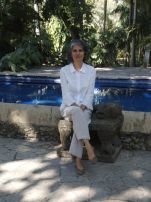 teólogo, matemático, astrólogo, rebelde, pirata, soldado del Imperio español y espía de la Corona en la Nueva España (hoy México). Encarcelado por la Inquisición a partir de 1642, fue en la cárcel defensor de los judíos y denunció a sus captores y verdugos. Logró huir de prisión en 1650 y denunció a la Inquisición en varios puntos centrales de la ciudad de México, incluida la cámara del virrey. Murió en la hoguera, a pesar de que el propio rey de España intentó numerosas veces arrancarlo de las garras del Santo Oficio. Por su osadía y varias leyendas atadas a su nombre, se dice que es él quien da origen a “El Zorro”, emblemática y legendaria figura, inspiradora de mitos, novelas y películas.
teólogo, matemático, astrólogo, rebelde, pirata, soldado del Imperio español y espía de la Corona en la Nueva España (hoy México). Encarcelado por la Inquisición a partir de 1642, fue en la cárcel defensor de los judíos y denunció a sus captores y verdugos. Logró huir de prisión en 1650 y denunció a la Inquisición en varios puntos centrales de la ciudad de México, incluida la cámara del virrey. Murió en la hoguera, a pesar de que el propio rey de España intentó numerosas veces arrancarlo de las garras del Santo Oficio. Por su osadía y varias leyendas atadas a su nombre, se dice que es él quien da origen a “El Zorro”, emblemática y legendaria figura, inspiradora de mitos, novelas y películas.
Andrea Martínez Baracs es mexicana, Doctora en Historia por El Colegio de México. Se especializó en etnohistoria virreinal (siglos XVI-XVIII) y escribió siete libros, de manera individual o junto a otros autores, sobre la provincia indígena de Tlaxcala, México, durante esos siglos. Realizó otras obras de historia, como el “Repertorio de Cuernavaca” (Editorial Clío, 2011). Dirige desde noviembre 2008 para Conaculta la Biblioteca Digital Mexicana, la cual publica documentos históricos que se caracterizan por su rareza y unicidad. Su obra, “Don Guillén de Lampart, Hijo de sus Hazañas”, incluye manuscritos originales del propio Lampart, nunca antes publicados, contribuyendo sustancialmente de esta manera a la investigación sobre este personaje histórico.
This evening we offer you an interesting talk: A 17th century Irishman in Mexico, revolutionary and mystic poet: William Lamport or “El Zorro” in Mexico. Once again we have the invaluable support of the Embassy of Mexico in Ireland. We hope to see you at 6.30pm at Café Literario.
Don Guillén de Lampart (William Lamport or Guillermo Lombardo, 1611-1659), originally from Wexford in Ireland, was a theologian, mathematician, astrologist, rebel, pirate, soldier of the Spanish Empire and a spy for the Crown of the New Spain (Mexico today). Imprisoned by the Inquisition in 1642, while in jail he was a defender of the Jews and denounced their captors and torturers. He managed to escape from prison in 1650 and denounced the Inquisition in various parts of Mexico City including the Viceroy’s Chamber. He died on the Stake despite various attempts by the King of Spain to grab him from the clutches of the Inquisition. For his audacity and the several legends associated with his name, they say that it was he who gave rise to “El Zorro”, emblematic and legendary figure who inspired myths, novels and films.
Andrea Martinez Baracs is Mexican, and has a PhD in History from El Colegio de México. She specialized in Mexican Colonial History (centuries XVI-XVIII) and wrote, alone or with other scholars, seven books on the Indigenous province of Tlaxcala, Mexico, in those centuries. She has done other historical books, like the “Repertoire of Cuernavaca”. Since 2008 she is the Director of the Mexican Digital Library, which publishes rare historical documents. Her work, “Don Guillén de Lampart, Son of his Own Exploits”, includes original writings by Lampart, never before published, and so is a substantial contribution to the research about this historical figure.
Conferencia: Viviendo fuera o el sentimiento en las palabras del idioma materno | Lecture: Living abroad or sentiment in the mother tongue
Esta tarde y con la inestimable cooperación de la Embajada de México os ofrecemos una interesante charla sobre el papel de la lengua materna en la vida de aquellas personas que por una circunstancia u otra viven en otro país. Te esperamos a las 18:30 en el Café Literario.
Al vivir lejos de la tierra materna, algunas palabras de nuestro idioma nos generan emociones de nostalgia, cariño o cercanía. Con conceptos psicológicos, filosóficos y semánticos, la conferencia versará sobre el lenguaje materno hablado a la distancia. Inspirada en el proyecto “El jardín de nuestra lengua”, la plática tiene como objetivo reflexionar en la cualidad emocional de las palabras del idioma materno cuando se vive fuera, así como revelar las posibilidades de su uso a través de tecnologías como “skype”. Con este fin, Helen Blejerman revelará estadísticas, hará preguntas al público y quizá también, si la memoria ayuda, contará historias.
Helen Blejerman es escritora y artista. Nació en la Ciudad de México y vive en el Reino Unido desde el año 2006. Después de exhibir sus proyectos artísticos nacional e internacionalmente, su práctica viajó orgánicamente hacia la literatura y la radio. Helen escribe cuento corto y lo publica con editoriales Mexicanas. Además escribe proyectos que en su fase final son series radiofónicas. También es una invitada frecuente en la BBC Radio de Sheffield. Su trabajo explora en general, nociones de hogar y distancia, y en particular, la manera en que las palabras del idioma materno detonan sensaciones de pertenencia y cierran el espacio entre la persona que vive fuera y su tierra. Helen es catedrática asociada en el Departamento de Bellas Artes en la Universidad de Sheffield Hallam.
This evening we offer you a talk with the invaluable cooperation of the Embassy of Mexico in Ireland. It is about the role of mother tongue for people living in another country due to different circumstances. We hope to see you today at 6.30pm in the Café Literario.
When living far away from homeland, some words of our language provoke strong emotions of nostalgia, affection or closeness. Using psychological, philosophical and semantic concepts, the conference will focus on maternal language spoken from abroad. Inspired by the project “Our Language Garden” the objective of the talk is to reflect on theemotional quality of words in the native tongue when living abroad, and also to reveal the possibilities of their use through technologies like “skype”. To this end, Helen Blejerman will reveal statistics, will ask the audience questions and perhaps, if memory permits, tell stories.
Helen Blejerman is a writer and artist. She was born in Mexico City and she has been based in the UK since 2006. After exhibiting her art projects nationally and internationally her practice travelled organically into writing and radio. Helen writes and publishes short stories for Mexican publishers and writes and devises projects that in the final stage become radio shows. Helen is also a frequent guest at BBC Radio Sheffield. Her work explores in general, notions of home and distance, and in particular, she is interested in researching the way in which certain words trigger strong feelings of belonging, closing the emotional gap between the person abroad and their homeland. Helen is an associate lecturer in the Department of Fine Art at Sheffield Hallam University.
[Video] Elena Durán en el Instituto Cervantes de Dublín
Elena Durán es una de las flautistas más carismáticas en el mundo. Ha ofrecido conciertos y ha grabado discos con muchas de las orquestas más prestigiadas del Reino Unido, Europa y Estados Unidos, así como con prácticamente todas las orquestas importantes de México. En esta entrevista realizada por Irene, compañera de la Embajada de México en Irlanda, nos cuenta su trayectoria. Edición de video: Cris Méndez.
Elena Durán is one of the most charismatic flute players in the world today. She has made concerto appearances and recordings with many major orchestras in the UK, Europe, the United States and with virtually every orchestra in Mexico. In this video, Elena told us about her musical career. Interviewed by Irene. Video edited by Cris Méndez.
Audiolibro de la semana | Audiobook of the Week: El huésped
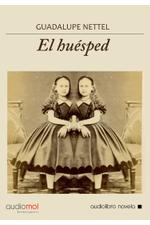 El audiolibro de la semana es una de las propuestas más interesantes de la literatura mexicana reciente: El huésped de Guadalupe Nettel. Para descargarte esta historia fascinante necesitas la tarjeta de la biblioteca y hacer click aquí.
El audiolibro de la semana es una de las propuestas más interesantes de la literatura mexicana reciente: El huésped de Guadalupe Nettel. Para descargarte esta historia fascinante necesitas la tarjeta de la biblioteca y hacer click aquí.
La extraña historia de una niña habitada interiormente por un ser inquietante, quizás imaginario, quizás no. Ana sostiene una lucha silenciosa contra esa hermana siamesa, hasta que el huésped comienza a manifestarse en su entorno familiar de una manera devastadora.
Alrededor de esa presencia se fraguan los acontecimientos de una vida, entre ellos las tragedias familiares, su existencia como adulta. Los personajes, incluida la ciudad, se desdoblan en una confusión de reflejos, se mueven entre lo superficial y lo profundo, sin que sepamos nunca el territorio que pisamos. También describe la cara subterránea de la ciudad de México.
Son personas que no encuentran un lugar en el mundo y se organizan en grupos paralelos que imponen sus propios valores y que comprenden su rara belleza. La autora explora estos universos guiada por una intuición: en los aspectos que nos negamos a ver del mundo -o de nosotros mismos- se esconden las pautas que nos ayudan a sobrellevar la existencia.
The audiobook of the week is one of the most interesting novels of recent Mexican narrative: El huésped by Guadalupe Nettel. If you wish to download this fascinating story you need your library card and make click here.
This is the strange story of a girl who has a disturbing living being inside her, maybe imaginary, maybe not. Ana has a silent fight with her “Siamese sister” until it starts to act in her home environment in a devastating way.
Life, family tragedies and her existence as an adult evolve around this living being. The characters, including the city, are divided in a confusion of reflections and move between the superficial and the profound. We never know the territory where we are stepping. It is also described the subterranean side of Mexico DF.
These are people who are not able to find a place in the world and they organize each other in parallel groups who understand their rare beauty and have their own values. The author explores these universes guided for an intuition: the clues that help us to bear our existence lie in the aspects of the world or of ourselves that we don´t want to see.
Charla y degustación: Cocina mexicana y tequila | Talk and tasting: Mexican Cuisine and Tequila
Esta tarde tenemos un suculento programa doble en colaboración con la Embajada de México en Irlanda. A partir de las 17:30, el Café Literario abre sus puertas con una charla en español a cargo de Claudio Laredo que llevar por título: Cocina mexicana: riqueza, colorido y variedad.
17:30, el Café Literario abre sus puertas con una charla en español a cargo de Claudio Laredo que llevar por título: Cocina mexicana: riqueza, colorido y variedad.
A las 18:30 será José Torres Díaz el encargado de deleitarnos con los secretos de una de las bebidas mexicanas más representativas: el tequila. Esta charla será en español y en inglés.
No solo tendrás la oportunidad de ampliar tus conocimientos teóricos sobre la materia sino que además podrás degustar los exquisitos sabores de México. ¡No te lo puedes perder!
 This evening we have a succulent double programme in cooperation with the Embassy of Mexico in Ireland. Café Literario will open its doors at 5.30pm with a talk in Spanish with Claudio Laredo. The name of this event is Mexican Cuisine: unique variety, colour and richness.
This evening we have a succulent double programme in cooperation with the Embassy of Mexico in Ireland. Café Literario will open its doors at 5.30pm with a talk in Spanish with Claudio Laredo. The name of this event is Mexican Cuisine: unique variety, colour and richness.
At 6.30pm José Torres Díaz will be in charge of a talk about one of the most representative spirits of Mexico: Tequila. This talk will be in Spanish and in English.
Not only will you have the chance of widening your theory but you also will be able to try the delicious tastes of Mexico. You cannot miss it!
Taller bebidas mexicanas: El mezcal | Mexican Spirits Workshop: Mezcal
 Hoy, a partir de las seis de la tarde, podrás participar en un taller sobre las bebidas mexicanas, más concretamente sobre el Mezcal, y su degustación. No olvides hacer tu reserva en reservas.dublin@cervantes.es.
Hoy, a partir de las seis de la tarde, podrás participar en un taller sobre las bebidas mexicanas, más concretamente sobre el Mezcal, y su degustación. No olvides hacer tu reserva en reservas.dublin@cervantes.es.
Desde 1998, la Asociación Pro Cultura Mezcal A.C., investiga, estudia y difunde la cultura del mezcal, un ancestro venerable de la gastronomía mexicana y una de las formas más puras de alcohol que existen en el mundo para el consumo humano.
El propósito de este taller es: cata y formación.
Cata: Mezcal blanco.
Formación: Cómo beber mezcal.
Dicen los expertos que el mezcal es afrodisíaco, una bebida mística, mágica y asombrosa, que si se ingiere con mesura, es una bebida que estimula, que ahuyenta la negatividad, hace crecer la imaginación, hace olvidar los resentimientos, acompaña en la soledad y que ayuda a ver el mundo simplemente como un lugar mejor.
Esta tarde, esperamos poder conocer uno de los secretos mejor guardados de la gastronomía mexicana.
 Do you want to know more about Mezcal, one of the traditional spirits from Mexico? You can participate in a workshop about this drink today at 6pm at Café Literario. Don´t forget to make your reservation: reservas.dublin@cervantes.es
Do you want to know more about Mezcal, one of the traditional spirits from Mexico? You can participate in a workshop about this drink today at 6pm at Café Literario. Don´t forget to make your reservation: reservas.dublin@cervantes.es
Since 1998, The Association for Mezcal Culture, A.C, has been studying, researching and promoting the culture of a venerable ancestor of the Mexican gastronomy, mescal, one of the purest forms of alcohol that exists in the world for human consumption.
The purpose of this workshop is: Tasting and educating.
Tasting: Silver Mezcal
Educating: How to Drink Mezcal
Experts say mezcal is a mystic, magic aphrodisiac and an extraordinary drink. When drunk with measure, it wakes the spirit, tames enmity, stimulates imagination, clears resentments, accompanies solitude, and makes the world seem just… a little better.
We look forward to know better one of the best kept secrets of the Mexican gastronomy.
El presidente Michael D. Higgins en el Instituto Cervantes de Dublín / President Michael D. Higgins in the Instituto Cervantes in Dublin
El presidente de Irlanda, Michael D. Higgins, inauguró oficialmente la primera edición del Festival ISLA de Literatura el pasado 2 de noviembre en el Instituto Cervantes de Dublín. y con ello contribuyó de manera decisiva a su éxito. El festival, por el que pasaron a lo largo del fin de semana cerca de mil asistentes, reunió a escritores de Argentina, Chile, Cuba, México, Irlanda y España en torno a una serie de lecturas, mesas redondas y proyecciones cinematográficas.
El presidente habló ante una sala abarrotada con cerca de 200 personas y les dio la bienvenida en español, irlandés, e inglés. Después de saludar a los asistentes, centró su alocución en los recuerdos de su reciente viaje diplomático por América Latina.
«He regresado recientemente de mi visita a Chile, Brasil y Argentina, una parte del mundo que tiene un lugar especial en mi corazón», dijo Higgins. «Durante este viaje, me llamó la atención una vez más la profundidad del compromiso con la cultura y la literatura irlandesa que existe en América Latina y cómo nuestras dos tradiciones se han influido y enriquecido mutuamente».
Higgins habló después sobre el papel que la escritora Kate O’Brien ha jugado en la literatura irlandesa y española, y la intensa conexión de la autora con España.
El amor del presidente por la poesía también se hizo evidente cuando aplaudió el énfasis que el Festival ISLA de Literatura hizo sobre este género en su programa. «Estoy impresionado por la profundidad y la fuerza de la poesía en este programa. Seamus Heaney, en su magnífica colección de ensayos «The Redress of Poetry», habla de cómo la poesía equilibra «la balanza de la realidad hacia un cierto equilibrio trascendente». El festival ISLA, con sus fuertes elementos interculturales, y los muchos poetas representados en él, como Maighread Medbh y Lorna Shaughnessy, parece tener esa inventiva deliciosa de la que Heaney habla en su obra».
El presidente finalizó leyendo el poema de Oliver St. John Gogarty «An Long» primero en lengua irlandesa y después en inglés.
Información basada en la nota de prensa de Megan Specia y Sergio Angulo.
Michael D. Higgins launched the first Irish, Spanish, and Latin America (ISLA) Literary Festival on the evening of November 2 in the Instituto Cervantes in Dublin. The festival, which brought together writers from Argentina, Chile, Cuba, Mexico, Ireland and Spain, was held over the weekend and featured a series of readings and round table discussions.
The President spoke to a crowd of approximately 200 participants and welcomed them in Spanish, Irish, and English. After greeting the crowd, he spoke to those gathered about a recent diplomatic trip to Latin America.
“I have recently returned from visiting Chile, Brazil, and Argentina, a part of the world which has a cherished place in my heart,” said Higgins. “During these visits, I was struck again by the depth of the engagement with Irish culture and writing that exists in Latin America and how our two traditions have influenced and enriched each other.”
Higgins went on to speak about the role than writer Kate O´Brien has played in Irish and Spanish literature, and the intense connection of the author to Spain.
The President´s love of poetry was also evident when he applauded ISLA´s emphasis on the genre. Said Higgins, “[I am] impressed by the depth and strength of poetic representation in the programme. Seamus Heaney, in his great collection on ´The Redress of Poetry´, speaks of how poetry balances ´the scales of reality towards some transcendent equilibrium´. The ISLA festival, with its strong intercultural elements, and the many poets represented like Maighread Medbh and Lorna Shaughnessy … would seem to have that self-delighting inventiveness of which Heaney speaks.”
He closed by reading Oliver St. John Gogarty´s poem “An Long” (The Ship) first in the Irish language and then in English.
Megan Specia & Sergio Angulo
Concierto de la flautista Elena Durán | Concert of the flute player Elena Durán
La Embajada de México en Irlanda y el Instituto Cervantes de Dublín te invitan hoy a las siete de la tarde a disfrutar de la música de Elena Durán, una de las flautistas más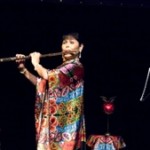 carismáticas en el mundo.
carismáticas en el mundo.
Elena Durán ha ofrecido conciertos y ha grabado discos con muchas de las orquestas más prestigiosas del Reino Unido, Europa y Estados Unidos, así como con prácticamente todas las orquestas importantes de México. Entre sus éxitos, cabe destacar la interpretación de su repertorio junto a la Real Orquesta Filarmónica en sendas galas celebradas en el Royal Albert Hall de Londres ante la reina Isabel II de Inglaterra.
Su actual proyecto, Amorcito Corazón, que presentará en el Instituto Cervantes de Dublín, está dedicado a las creaciones y las películas que musicalizó el gran compositor mexicano Manuel Esperón.
Elena fue recientemente nombrada “Embajadora de la Ciudad de México” en reconocimiento a su excepcional carrera y su trabajo comunitario.
We hope to see you today at 7pm at Cafe Literario where we offer you a concert of Elena Durán, one of the most charismatic flute players in the world today.
She has made concerto appearances and recordings with many major orchestras in the UK, Europe, the United States and with virtually every orchestra in Mexico. Elena has played regularly for members of the British Royal Family, including two Royal Galas with the Royal Philharmonic Orchestra in London’s Royal Albert Hall in front of Her Majesty the Queen.
Her current project, Amorcito Corazón, which she will be presenting at the Cervantes Institute in Dublin, is devoted to the music and the movies of the great Mexican composer Manuel Esperón.
Elena was recently named as “Mexico City’s Ambassador” in recognition of her exceptional career and her out-reach work.
This event has been organized with the cooperation of the Embassy of Mexico in Ireland.
[Video] Christopher Domínguez Michael en el Festival Isla de Literatura / Isla Literary Festival
Christopher Domínguez Michael participó en la mesa redonda “Escritores sin escrúpulos: intimidad, violencia y humor en literatura” / Writers without scruples: Intimacy, violence and humour in literature. Entrevistado por Sergio Angulo. Edición de video: Cris Méndez.
Temas como la identidad y la memoria, la violencia o el humor fueron tratados por los invitados Ita Daly, Christopher Domínguez Michael, Rafael Gumucio y Catherine Dunne, con la moderación de Ciaran Cosgrove (Trinity College Dublin).
Christopher Domínguez Michael (Ciudad de México, México, 1962), historiador y ensayista, es uno de los más conocidos críticos literarios hispanoamericanos. Es autor de numerosas publicaciones, siendo su última publicación Profetas del pasado: Quince voces sobre la historiografía de México (2011).
Es miembro del Sistema Nacional de Creadores de Arte desde 1993. Su Diccionario crítico de la literatura mexicana, 1955–2005 ha sido traducido y actualizado al inglés en 2012.
Topics such as identity and memory, violence or humour were dealt with by guests Ita Daly, Christopher Domínguez Michael, Rafael Gumucio and Catherine Dunne, chaired by Ciaran Cosgrove (Trinity College Dublin).
Christopher Domínguez Michael (Mexico City, Mexico, 1962) is a historian and essayist, and also one of the most famous Hispanic-American literary critics. He is the author of several works, being his latest novel Profetas Del Pasado. Quince Voces Sobre La Historiografía De México was published in 2011.
He is a member of the Sistema Nacional de Creadores de Arte (National System for Art Creators) since 1993. His work Diccionario Crítico de la Literatura Mexicana, 1955-2005 (Critical Dictionary of Mexican Literature, 1955–2010) has been translated into English and was updated in 2012.
Proyección | Film Screening: Neruda, el Hombre y su Obra
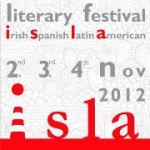 Para terminar el segundo día del Festival de Literatura ISLA os ofrecemos un interesante cortometraje de Neruda. Te esperamos el próximo día 3 de Noviembre a las 18:00 en el Café Literario.
Para terminar el segundo día del Festival de Literatura ISLA os ofrecemos un interesante cortometraje de Neruda. Te esperamos el próximo día 3 de Noviembre a las 18:00 en el Café Literario.
Este documental rescata la memoria, pero también la vigencia de obra y pensamiento de Pablo Neruda, uno de los personajes mas universales de la cultura chilena, y es la primera y única hasta ahora que abarca completamente la vida y obra de este fundamento de la identidad chilena. La cámara recorre Chile y los diversos países del mundo donde Neruda llevó su arte y, con ello la voz de Chile y de lo más genuino de su gente. Además de profundizar en los valores artísticos, el documental aborda aspectos inéditos de Neruda como creador, pensador, amante, luchador social y embajador cultural, lo que convierte este audiovisual en un valioso documento contemporáneo no solo para los chilenos, sino también como un importante patrimonio en el archivo que la cultura mundial debe tener sobre Chile.
To finish the second day of ISLA Literary Festival we offer an interesting short of Neruda. We hope to see you the next November 3rd at 18:00 hrs in Café Literario.
This documentay recovers the memory, but also the validity of Pablo Neruda’s work and thought, one of the most universal characters of Chilean culture, and it is the first and so far only one to include completely the life and work of this foundation of Chilean identity. The camera travels around Chile and the various countries of the world where Neruda took his art, and with it the voice of Chile and of the most genuine of its people. In addition to studying in depth the artistic values, the documentary approaches some of Neruda’s unknown apects as a creator, thinker, lover, social fighter and cultural ambassador, which makes this film a valuable contemporary document not only for the Chilean, but also as an important heritage to the archive that world culture must have about Chile.
Hoy leemos con | Today we are reading with: Elia Barceló, Kevin Barry, Christopher Domínguez Michael, Keith Ridgway and María Negroni
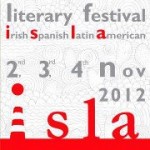 Ya solo quedan tres días para que de comienzo el esperado Festival ISLA de Literatura. Dentro de su programación, el sábado 3 de noviembre podremos disfrutar de un recital poético que dará comienzo a las tres y media de la tarde en nuestro Café Literario.
Ya solo quedan tres días para que de comienzo el esperado Festival ISLA de Literatura. Dentro de su programación, el sábado 3 de noviembre podremos disfrutar de un recital poético que dará comienzo a las tres y media de la tarde en nuestro Café Literario.
Elia Barceló, Kevin Barry, Christopher Domínguez Michael, Keith Ridway y María Negroni compartirán sus mejores textos con los asistentes al acto y unirán sus voces a este festival. La presentación, en este caso, correrá a cargo de Lorraine Kelly, de la Universidad de Galway (National University of Ireland). Pero, ¿quiénes son estos autores?, ¿no los conoces todavía?.
Elia Barceló (Alicante, España, 1957) ha publicado novelas policíacas, históricas, de ciencia ficción y género fantástico para adultos, así como novelas para jóvenes y ensayos. Ha sido traducida a diecisiete idiomas, entre ellos el inglés. Sus novelas traducidas al inglés hasta la fecha son: Corazón de tango (2007) (Heart of Tango, 2010) y El secreto del orfebre (2003) (The Goldsmith’s Secret, 2011).
Kevin Barry (Limerick). Su primer libro de relatos,There are Little Kingdoms, ganó el Premio Rooney de Literatura Irlandesa en 2007. Ha escrito sobre viajes y literatura para The Guardian, The Irish Times, The Sydney Morning Herald y muchas otras publicaciones. Su primera novela, City of Bohane (2011) ha sido galardonada en Reino Unido con el Authors’ club Best First Novel Award, que premia a la mejor primera novela del año.
Christopher Domínguez Michael (Ciudad de México, México, 1962), historiador y ensayista, es uno de los más conocidos críticos literarios hispanoamericanos. Es autor de numerosas publicaciones, siendo su última publicación Profetas del pasado. Quince voces sobre la historiografía de México (2011). Su Diccionario crítico de la literatura mexicana, 1955–2005 ha sido traducido y actualizado al inglés en 2012.
Keith Ridgway (Dublín, Irlanda, 1965). Su primera obra de ficción fue Horses (1997), a la que siguieronThe Long Falling (1998), Standard Time (2000); un libro de relatos, The Parts (2003); Animals (2006) yGoo Book (2011). Su última novela publicada esHawthorn & Child (2012). Ha recibido numerosos premios, entre ellos el Prix Femina Etranger y el Prix Premier Roman en París en 2001 por The Long Fallingbajo el título en francés Mauvais Pente, y el premio Rooney de literatura irlandesa en 2001. Las obras de Ridgway han sido traducidas a varios idiomas entre otros, el español.
María Negroni (Rosario, Argentina, 1951) es poeta, ensayista y novelista. Como poeta, ha publicado, entre otros libros: El viaje de la noche, Arte y Fuga,La Boca del Infierno y Cantar la nada. También ha publicado varios libros de ensayos y dos novelas. Su libro Islandia recibió el premio del PEN American Center en Nueva York al mejor libro de poesía en traducción del año (2001) y Galería Fantástica recibió el Premio Internacional de Ensayo de Siglo XXI (México). Su obra ha sido traducida al inglés, francés, sueco e italiano.
This event of ISLA Literary Festival will be an outstanding poetry reading in November 3rd at 3:30 at Café Literario.
Authors will read a selection of some of their best work in their original language in this poetry reading. Introduced by: Lorraine Kelly (NUI Galway).
Elia Barceló (Alicante, Spain, 1957) has published crime, historical, science fiction and fantastic novels for adults, as well as young adult books and essays. Her work has been translated into several languages, Spanish between others. Her novels translated into English are: Corazón de tango (2007), translated into English under the name Heart of Tango (2010) andThe Goldsmith’s Secret (2011), a translation of El secreto del orfebre (2003).
Kevin Barry was born in Limerick and now lives in Sligo. His first collection of short stories, There Are Little Kingdoms, won the Rooney Prize for Irish Literature in 2007. He has written about travel and literature for The Guardian, The Irish Times, The Sydney Morning Herald and many other publications. His debut novel City of Bohane (2011) recently won the Authors’ Club Best First Novel award in Britain.
Christopher Domínguez Michael (Mexico City, Mexico, 1962) is a historian and essayist, and also one of the most famous Hispanic-American literary critics. He is the author of several works, being his latest novel Profetas Del Pasado. Quince Voces Sobre La Historiografía De México was published in 2011. Since 2010 he has also worked as associate researcher at the Colegio de México. His workDiccionario Crítico de la Literatura Mexicana, 1955-2005 (Critical Dictionary of Mexican Literature, 1955–2010) has been translated into English and was updated in 2012.
María Negroni (Rosario, Argentina, 1951) is a poet, essayist and novelist. She has published numerous poetry books: Islandia, El viaje de la noche, Arte y Fuga, La Boca del infierno and Cantar la nada, to mention just a few. She has also published various essays collections and two novels. Her book Islandiareceived the 2001 PEN American Center Award for best book of poetry in translation. She was awarded the 21st Century International Essay Prize (Mexico) for her book Galería Fantástica. Her work has been translated into English, French, Swedish and Italian.
Keith Ridgway (Dublin, 1965). His first fictional prose Horses was published in 1997, followed by The Long Falling (1998), Standard Time (2000). A collection of short fiction, The Parts (2003), Animals(2006), Goo Book (2011) and Hawthorn & Child(2012). He has received numerous awards such as the Prix Femina Etranger and the Prix Premier Roman in Paris in 2001 for The Long Falling, under its French title of Mauvaise Pente, and The Rooney Prize For Irish Literature in 2001. His work has been translated into several languages and has been published in Spain, between other countries.
Mesa Redonda: Escritores sin escrúpulos: Intimidad, violencia y humor en la literatura | Round table discussion: Writers without scruples: Intimacy, violence and humour in literature
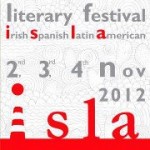 La primera actividad en el Festival Literario ISLA será una discusión literaria, que tendrá lugar el 3 de Noviembre a las 11:30 en el Café Literario.
La primera actividad en el Festival Literario ISLA será una discusión literaria, que tendrá lugar el 3 de Noviembre a las 11:30 en el Café Literario.
Temas como la identidad y la memoria, la violencia o el humor serán tratados por los invitados Ita Daly, Christopher Domínguez Michael, Rafael Gumucio y Catherine Dunne, con la moderación de Ciaran Cosgrove (Trinity College Dublin).
Ita Daly (Drumshanbo, Leitrim, Irlanda) ha publicado cinco novelas, una colección de cuentos y dos libros infantiles. Ha recibido el premio Hennessy Literary Award y el Irish Times Short Story Award. Su obra ha sido traducida al sueco, danés, japonés, italiano y alemán y sus relatos cortos han aparecido en revistas de Irlanda, Inglaterra y Estados Unidos. Uno de sus libros de relatos, The Lady With the Red Shoes, forma parte del plan de estudios de las escuelas de secundaria alemanas.
Christopher Domínguez Michael (Ciudad de México, México, 1962), historiador y ensayista, es uno de los más conocidos críticos literarios hispanoamericanos. Es autor de numerosas publicaciones, siendo su última publicación Profetas del pasado. Quince voces sobre la historiografía de México (2011). Es miembro del Sistema Nacional de Creadores de Arte desde 1993. Su Diccionario crítico de la literatura mexicana, 1955–2005 ha sido traducido y actualizado al inglés en 2012.
Rafael Gumucio (Santiago, Chile, 1970) ha trabajado como periodista en numerosos diarios nacionales chilenos, españoles y en el New York Times. En 1995 publicó el libro de relatos Invierno en la Torre y Memorias Prematuras. Ha publicado también las novelas Comedia Nupcial, Los Platos Rotos y Páginas Coloniales. Su última novela es La Deuda (2009). Actualmente es Director del Instituto de Estudios Humorísticos de la Universidad Diego Portales y co-conductor de Desde Zero en Radio Zero.
Catherine Dunne (Dublín, 1954), estudió inglés y español en Trinity College de Dublín. Su primera novela, In the Beginning, fue publicada en 1997. Le siguió A Name for Himself, finalista del premio Kerry Fiction Prize. Ha publicado otras seis novelas, The Walled Garden (2000), Another Kind of Life (2003), Something Like Love (2006), At a Time Like This(2007), Set in Stone (2009), Missing Julia (2011) y el ensayo An Unconsidered People: The Irish in Sixties London (2003). Sus novelas The Walled Garden (El jardín vallado) y A Name for Himself (Un nombre propio) han sido traducidas al español.
The first event in 3rd November of ISLA Literary Festival is a literary discussion, and it will take place at Café Literario at 11:30.
Topics such as identity and memory, violence or humour will be dealt with by guests Ita Daly, Christopher Domínguez Michael, Rafael Gumucio and Catherine Dunne, chaired by Ciaran Cosgrove (Trinity College Dublin).
Ita Daly (Drumshambo, Co. Leitrim) has published five novels, one collection of short stories and two books for children. She has won two Hennessy Literary Awards and an Irish Times Short Story Award. Her last novel, Unholy Ghosts (1997), was long listed for the International IMPAC Dublin Literary Award. Her work has been translated into Swedish, Danish, Japanese, Italian and German and her short stories have appeared in magazines in Ireland, England and America. Her short story collection The Lady With the Red Shoes (1980) is currently on the secondary school curriculum in Germany.
Christopher Domínguez Michael (Mexico City, Mexico, 1962) is a historian and essayist, and also one of the most famous Hispanic-American literary critics. He is the author of several works, being his latest novel Profetas Del Pasado. Quince Voces Sobre La Historiografía De México was published in 2011. He is a member of the Sistema Nacional de Creadores de Arte (National System for Art Creators) since 1993. His work Diccionario Crítico de la Literatura Mexicana, 1955-2005 (Critical Dictionary of Mexican Literature, 1955–2010) has been translated into English and was updated in 2012.
Rafael Gumucio (Santiago, Chile, 1970) has worked as a journalist for many Chilean and Spanish newspapers, as well as the New York Times. In 1995 he published the collection of short stories Invierno en la Torre and Memorias prematuras. He also published the novels Comedia Nupcial, Los Platos Rotos and Páginas Coloniales. His latest novel, La Deuda, was published in 2009. He now works as the director of the Institute for Humour Studies of the University Diego Portales and is co-conductor of Desde Zero at the radio station Zero. He received the Anna Seghers Award in Germany in 2002.
Catherine Dunne (Dublin, 1954). She studied English and Spanish at Trinity College, Dublin. Her first novel, In the Beginning, was published in 1997. A Name for Himself followed a year later, and was short listed for the Kerry Fiction Prize. She has published six further novels, The Walled Garden (2000),Another Kind of Life (2003), Something Like Love(2006), At a Time Like This (2007), Set in Stone(2009), Missing Julia (2011) and the non-fiction bookAn Unconsidered People: The Irish in Sixties London(2003). Her novels The Walled Garden (El jardín vallado) and A Name for Himself (Un nombre propio) have been translated into Spanish.
Festival Literario ISLA / ISLA Literary Festival
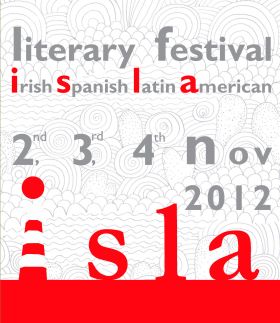 Irlanda es una isla grande y fértil. Una isla sembrada de escritores y de buena literatura. Un escritor, en algún momento de su labor creativa, también ha de convertirse en una isla, retirarse en silencio hasta el lugar en donde se encuentran las palabras, esas mismas palabras que luego descubrirá algún lector solitario, como un tesoro en una isla pirata, un tesoro en forma de libro.
Irlanda es una isla grande y fértil. Una isla sembrada de escritores y de buena literatura. Un escritor, en algún momento de su labor creativa, también ha de convertirse en una isla, retirarse en silencio hasta el lugar en donde se encuentran las palabras, esas mismas palabras que luego descubrirá algún lector solitario, como un tesoro en una isla pirata, un tesoro en forma de libro.
Un buen libro es una isla que contiene el universo.
ISLA es también el nombre que hemos querido dar a nuestro festival de literatura. Es el acrónimo de “Irish, Spanish and Latin American” Literary Festival. Es por tanto, también, una ISLA grande, fértil y multicultural en la que estamos todos unidos, irlandeses, latinoamericanos y españoles, por primera vez, en torno a la literatura.
Nunca antes se había celebrado un festival de estas características. Sin embargo, creemos que hacía ya mucho tiempo que venía siendo necesario. Hoy, gracias al entusiasmo demostrado tanto por Dublin UNESCO City of Literature, Ireland Literature Exchange, Poetry Ireland y el apoyo de las universidades Dublin City University, NUI Galway, NUI Maynooth y Trinity College Dublin, como por las embajadas de Argentina, Chile, Cuba, México y por supuesto por la Embajada de España, de la que el Instituto Cervantes forma parte, este festival es una realidad. Solo podemos tener palabras de agradecimiento para todos ellos.
Y aquí estamos todos, unidos en este proyecto. Comprometidos, comunicados, reunidos en este hermoso territorio común en el que hemos depositado tantas ilusiones.
No tiene sentido que algunas de las literaturas más fecundas del planeta sigan viviendo de espaldas entre sí. Es necesario que del intercambio de experiencias e ideas, de un mejor conocimiento entre unos y otros surjan nuevas traducciones, nuevos libros y, sobre todo, nuevos lectores.
Bienvenidos a nuestra ISLA.
Ireland is a great and fertile Island. It is an Island cultivated with writers and high quality literature. A writer during the course of his creative work must also become an island, withdrawing in silence to a place where words are kept. Those same words which some solitary reader will discover like hidden treasure on a pirate island, treasure in the form of a book.
A good book is a universe within an island.
The Spanish for ‘island’ is ‘ISLA’. It is the name we have chosen for our Literary Festival. It is the acronym for ‘Irish, Spanish and Latin American’ Literary Festival. It is also in that way a great, fertile and multicultural island where the Irish, Latin Americans and Spanish for the first time are all united and gathered around literature.
Never before has such a festival taken place. However, we believe it to be a much needed, unique event that has been a long time coming. Today, and thanks to the enthusiasm of Dublin UNESCO City of Literature, Ireland Literature Exchange, Poetry Ireland and the support of Dublin City University, Trinity College Dublin, NUI Galway, NUI Maynooth, the Embassies of Argentina, Mexico, Chile and Cuba, and by the Spanish Embassy, of which Instituto Cervantes is a part, this Festival is now a reality. We can only offer words of sincere gratitude to all of them.
We are all here, united in this project. Committed, connected and gathered together in this beautiful shared place where we have invested so many dreams.
It does not make sense that some of the most fertile literary figures on the planet should live in disregard for one another. It is imperative that from the exchange of experiences and ideas and from a better understanding between one another, new translations, new literature and, above all, new readers should emerge.
We wish you a warm welcome to our ‘island’ ISLA.
